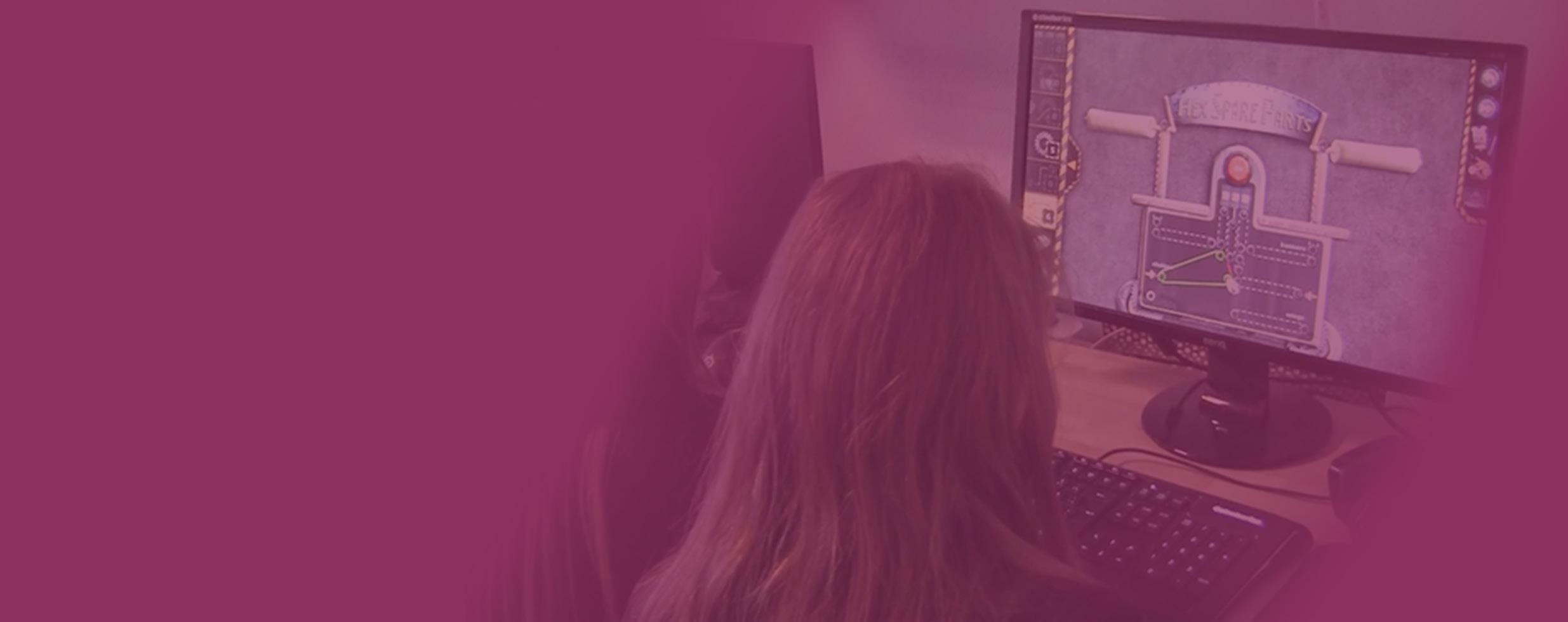
7 minute read
Case Study 1: “The Game workshop at Glostrup Albertslund Production school“
by Theilgaard
CASE STUDY 1 CASE STUDY 1
The Game workshop
Advertisement
Glostrup Albertslund Production school
Motivation for learning and education through computer games
How can the young people’s interest in computer games turn from being an obstacle to commencement of education, to instead promote the motivation and prerequisites for completing a youth education?
Background
An increasing number of young people in Denmark have difficulty in completing a youth education. The academic requirements for education programs have increased and too many young people are undecided about the direction of education they want. This means a big drop in youth education and often the young people lose faith in their own possibilities. Some of them isolate themselves with their computer and spend most of the waking time at stake. The real world becomes irrelevant to them, and dreams revolve around a future in the gaming world - either as a professional gamer or as a developer of computer games. Very few, however, seriously pursue the dream, and instead lose faith in education and work.
Production school
The purpose of the production school is to motivate and prepare young people for continued education. The target group is young people between the ages of 16 and 25 who are not ready to complete a youth education.
The teaching is organized as workshops in a number of different subject areas, giving the young people the opportunity to test one or more subjects in practice, thereby increasing their competencies and finding motivation for education. Unlike formal education, the goal of teaching at the production school is not a concrete and measurable academic benefit. The path to motivation for continuing education is instead based on the individual’s abilities and interests. Interest in traditional crafts has been declining in recent years, whereas media and IT have gained mo-
18 | The COURAGE Project

mentum, and the school has therefore established new workshops with IT productions.
Game Workshop - the history
The school has previously had education for young people with autism and interest in IT. Here was one of the thorough subject’s analysis and development of computer games. Over time, the subject developed to be the center of several elements of the education, which referred to personal and social skills, for example. Cooperation and understanding of social relations. Eventually, several professional elements were built, so there was a basis for offering it as an independent full-time Game workshop.
At the beginning (2014), all students were diagnosed within autism disorders, so the teaching was based on the issues that characterize this group. Collaboration with the school’s other workshops (where the young people were “normal”) led some of the students to try another workshop, and that other young people wanted to try the Game workshop. The experience was so succesful that it was decided to open to all interested in 2015 and the workshop was expanded from 10 to 18 students. By 2016, it is the school’s most popular workshop, and it is no longer possible to diagnose by admitting new students, only in interests and goals.
Case Study
The Game workshop is faced with some skepticism from the outside world, although the results are fully in line with the school’s other workshops, based on the number of young people who subsequently move on to education. This means that there is a desire to analyze and document the learning that takes place, the students background and future plans, the teaching methods and content, the academic, personal and social benefits, and the students’ subsequent education choices.
The aim of the study is to find the young people’s experience of teaching, thereby enhancing teachers’
The COURAGE Project | 19
attention to the different elements, and ensuring continued development in relation to the different student types that seek the workshop.
There is also a wish to spread the knowledge of teaching methods and the use of computer games in teaching, in a context that is not about playing but about collaborating, learning, developing and creating - in a frame that takes and motivates young people as otherwise Has difficulty entering into traditional education.
The Survey
In the school year 2016-17, a qualitative and quantitative study of the workshop has been conducted. The qualitative study is based on interviews of students and teachers as well as observations of teaching situations, and the quantitative study is statistical material concerning. Pupils background, stay and printing.
• 28 students have been enrolled at the workshop in a shorter or longer course. • 23 boys and 5 girls, mainly in the age from 16 to 20 years. • More than 50% of the students have tried to start a secondary education, 20% have not even completed primary school. • 2/3 (19 out of 28) have indicated one or more diagnoses upon enrollment. • Mainly autism disorder and anxiety/ social phobia, but also other mental difficulties or dyslexia. • The lenght of stay is generally longer than the other workshops in the production school, and most of the students continues with secondary education. • Some of them in an individual programme for a period to qualify for further education. • The success rate is generally higher than the other workshops, despite the students background is generally more challenging.
20 | The COURAGE Project
Students’ experience (summary of interviews).
There have been interviews with 6 students, at the start of the school year and towards the end. 4 of the young have discontinued education, 2 have not been in education.
The reasons for interruption have been very different: Personal problems, too much theory, lack of motivation, allergy and lack of learning. In common, however, everyone has had the feeling of not fit in and not being related to neither teachers nor the other students. They have therefore more or less lost courage compared to education.
Already at the initial interviews, the social environment in the gaming workshop is emphasized. There is a welcoming atmosphere and it is common for students to help each other with tasks and computer problems. In addition, it is accepted that you are different. There is room for one to be self if you cannot be in a community, but you will also be involved in the joint projects.
The social environment at the games workshop is emphasized as the most important factor of the benefit of teaching. There is a good relationship, and students teach / instruct / share knowledge so that everyone contributes and benefits from the many different skills found in the student group.
It is striking that the social environment is to something that the young people emphasize. When observing in the workshop, young people often sit on each computer and are busy with their own tasks. Several people avoid ordinary conversation, and some sit with headsets to shield off from interference. Relationships with the teachers and the other young people are almost entirely about the academic content, and this is the way they build their social contacts. Teachers have built up some daily and weekly routines that support the community, but it is always with a professional content. Even when played in between, the purpose of the activity is defined.

Activities that only have social content make bad memories of many who have felt outside in previous schooling. When it is still on the program, for example. In conjunction with the entire school, the students are involved in the preparation and have the opportunity to choose how they can participate. It may be as a photographer for a school party or as responsible for a gamer lounge. They thus learn how they can influence their participation, and as many of the team have the same problems, they can talk openly about how to tackle them.
In addition, the following are highlighted:
• The experience that the teaching / learning is driven by sincere interest, both for the teachers and the students. The relationship between formal learning and leisure interest is more or less solved. • Discover that their game experiences are valuable - that they actually can be used in other contexts - for example. When developing games for educational use. • The special educational environment where the participants largely define their learning goals and influence on the teaching. • You can almost learn what you want. If you are keen to immerse yourself and seek knowledge, you will be supported and guided through at the your actual level. • You develop at least as much personal and social as professional. You get to know yourself in interaction with others. • You recognize the connection between effort and dividend (and result). • Teachers are clear in their requirements and expectations in relation to the individual’s potential. • There is recognition and celebration of good productions, as well as the process.
The statistic results and the student’s statements about the benefits of teaching in the workshop, gives the teachers and the management team important knowledge in relation to the future development of the workshop and the school.
Sitography, Bibliography and references
Skole for alle. Strategi for et fælles skolevæsen i Albertslund Kommune 2012-2022. Albertslund Kommune. 2017 GAP - Glostrup Albertslund Produktionshøjskole gapro.dk AUC - Albertslund Ungecenter albertslund-ungecenter.skoleporten.dk AIF - Albertslund Idrætsforening albertslundif.dk Unge drømme – Stemmer fra en produktionshøjskole. Glostrup Bibliotek, 2017 www.eng.uvm.dk
The COURAGE Project | 21










